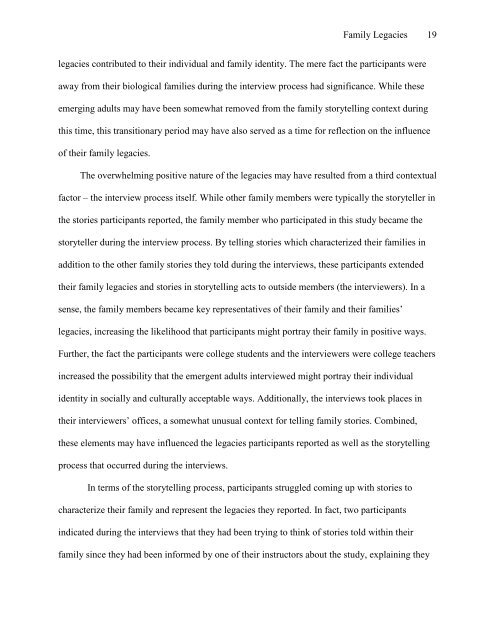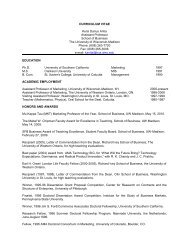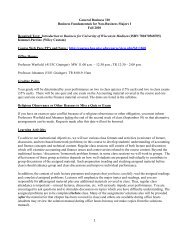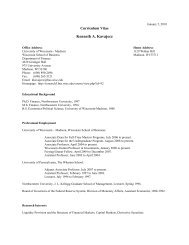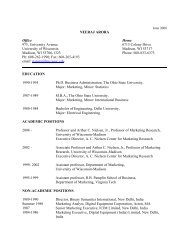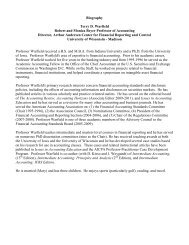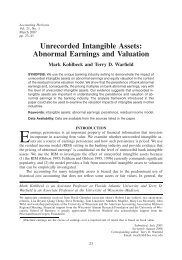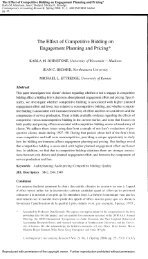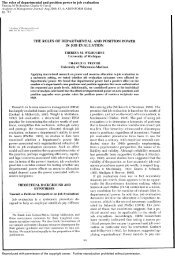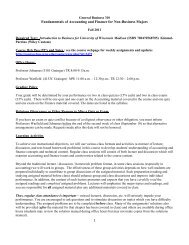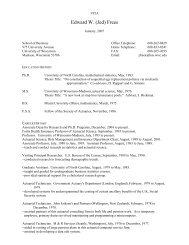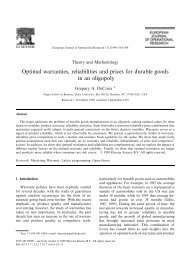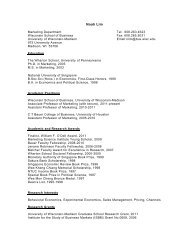family legacies - Wisconsin School of Business - University of ...
family legacies - Wisconsin School of Business - University of ...
family legacies - Wisconsin School of Business - University of ...
Create successful ePaper yourself
Turn your PDF publications into a flip-book with our unique Google optimized e-Paper software.
Family Legacies<br />
<strong>legacies</strong> contributed to their individual and <strong>family</strong> identity. The mere fact the participants were<br />
away from their biological families during the interview process had significance. While these<br />
emerging adults may have been somewhat removed from the <strong>family</strong> storytelling context during<br />
this time, this transitionary period may have also served as a time for reflection on the influence<br />
<strong>of</strong> their <strong>family</strong> <strong>legacies</strong>.<br />
The overwhelming positive nature <strong>of</strong> the <strong>legacies</strong> may have resulted from a third contextual<br />
factor – the interview process itself. While other <strong>family</strong> members were typically the storyteller in<br />
the stories participants reported, the <strong>family</strong> member who participated in this study became the<br />
storyteller during the interview process. By telling stories which characterized their families in<br />
addition to the other <strong>family</strong> stories they told during the interviews, these participants extended<br />
their <strong>family</strong> <strong>legacies</strong> and stories in storytelling acts to outside members (the interviewers). In a<br />
sense, the <strong>family</strong> members became key representatives <strong>of</strong> their <strong>family</strong> and their families’<br />
<strong>legacies</strong>, increasing the likelihood that participants might portray their <strong>family</strong> in positive ways.<br />
Further, the fact the participants were college students and the interviewers were college teachers<br />
increased the possibility that the emergent adults interviewed might portray their individual<br />
identity in socially and culturally acceptable ways. Additionally, the interviews took places in<br />
their interviewers’ <strong>of</strong>fices, a somewhat unusual context for telling <strong>family</strong> stories. Combined,<br />
these elements may have influenced the <strong>legacies</strong> participants reported as well as the storytelling<br />
process that occurred during the interviews.<br />
In terms <strong>of</strong> the storytelling process, participants struggled coming up with stories to<br />
characterize their <strong>family</strong> and represent the <strong>legacies</strong> they reported. In fact, two participants<br />
indicated during the interviews that they had been trying to think <strong>of</strong> stories told within their<br />
<strong>family</strong> since they had been informed by one <strong>of</strong> their instructors about the study, explaining they<br />
19


